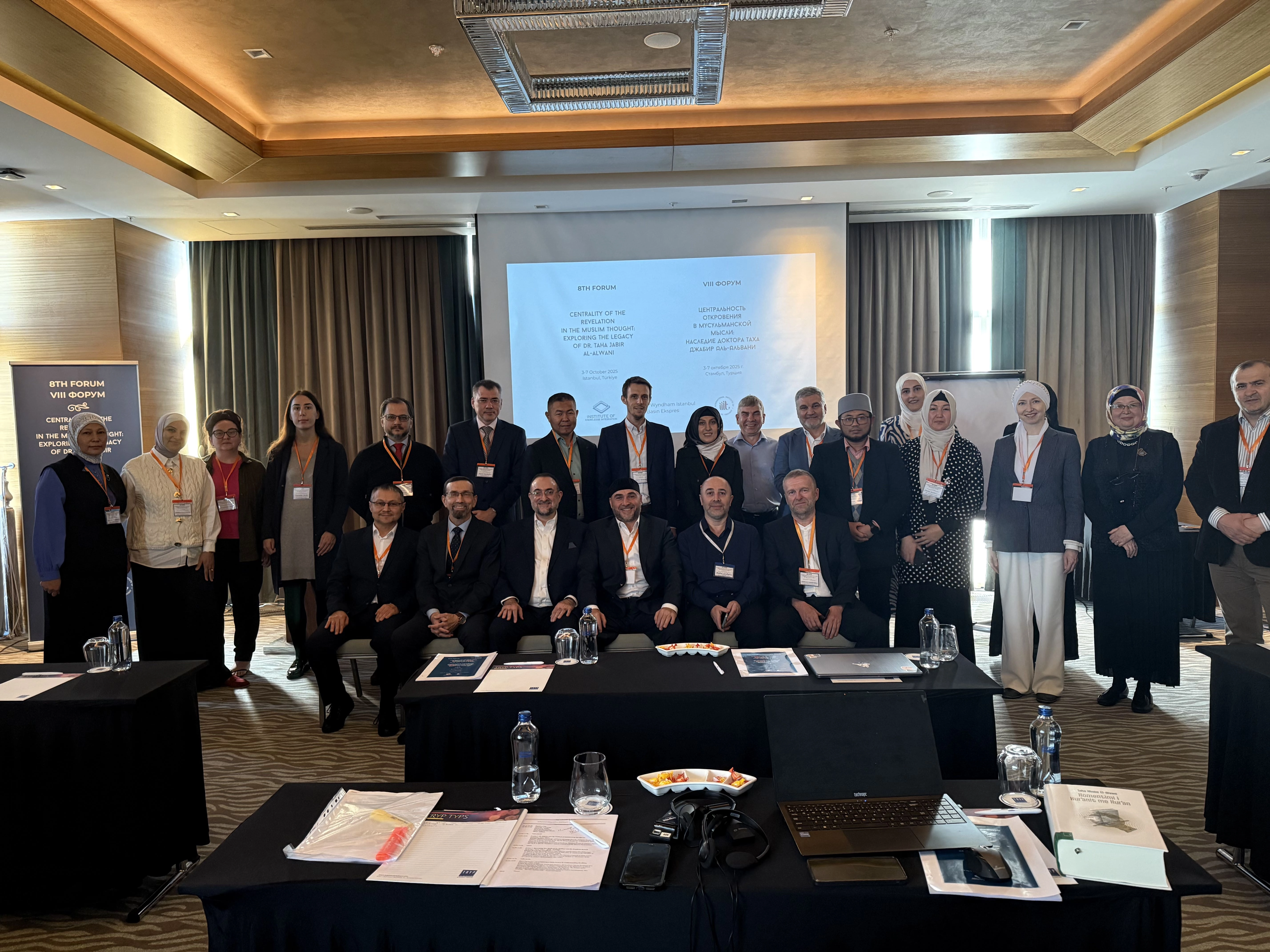The Institute of Knowledge Integration (IKI), in collaboration with the International Institute of Islamic Thought (IIIT), organized the 8th forum on “Centrality of the Revelation in the Muslim Thought: Exploring the Legacy of Dr. Taha Jabir Al-Alwani,” from 3 to 7 October 2025 in Istanbul, Türkiye.
This forum convened for the eighth time to discuss scholarly advancements concerning the understanding of the Qur’anic worldview, the integration of Qur’anic values and Islamic knowledge into education, and intellectual and research endeavors in the social and human acquired sciences within the Central Eurasian region.
The 8th forum provided an ideal platform for a transdisciplinary exchange among academicians, scientists, researchers, educators, and social activists native to the region. Over the course of three days, the paper presenters and participants engaged in extensive discussions regarding Al-Alwani's thought and methodology of integrating the Qur’anic worldview and Islamic value framework into the study of diverse intellectual and socio-religious issues, restoring the equilibrium between the Revelation and human intellect, and formulating methods to engage with the Qur’an as a foundation and source of thought, knowledge, and civilization.
The spectrum of in-depth discussions at the forum encompassed the following topics:
• The message of the Qur’an as an alternative methodological and epistemological vision on a cosmic level
• The interpretation of the Qur’an through the Qur’an
• The maqasid (objectives) of the Qur’an
• The position of the Sunnah in Islam and its fundamental relationship to the Qur’an
• Restoring the Divine Equilibrium (mizan) between the Revelation and reason
• The culture of disagreement in Islam
• The method of Two-Readings to integrate the Revelation and the real-existential
• Divine Revelation and the created cosmos as the sources of ma’rifah (experiential knowledge)
• Paradigm of Islamization of Knowledge, causes, meaning, and developments toward the idea of integration
• Building up a contemporary Islamic epistemological system
• Developing methods of dealing with the Qur’an and Sunnah as the sources of thought, knowledge and civilization
• The crisis of mentality and Muslim intellectual production deterioration
• Reforming of Islamic thought, Muslim educational curriculum, and institutions
The forum's program comprised 21 papers delivered across five scholarly sessions and three panel discussions, as well as two workshops pertinent to the institute's research and educational initiatives.
Day 1
The first working day of the forum commenced with the Opening Session, officiated by Mr. Muhammad Totonji, a member of the Board of Trustees, IIIT, and Assoc. Prof. Dr. Gapur Oziev, the Managing Director of IKI.
Subsequent to the coffee break, the first session commenced, featuring three distinguished speakers: Dr. Valmire Batatina Krasniqi and Selver Krasniqi (both from the Faculty of Islamic Studies in Pristina, Kosovo), and Dr. Mykhaylo Yakubovych (University of Freiburg, Germany). The presentations of these speakers elaborated Al-Alwani’s methodology of interpreting the Qur’an through the Qur’an and his contributions to contemporary Qur’anic discourse.
In the second session, held in the afternoon, two speakers – Assoc. Prof. Dr. Khairil Husaini Bin Jamil (ISTAC, International Islamic University Malaysia) and Ibragim Doskiev (Ingushetia, currently a student at IKI) – examined Al-Alwani's contributions to developing new methods for dealing with the Prophetic Sunnah.
After the coffee break, the first panel discussion commenced, featuring three young scholars – Gulara Rustamova (a UNICEF researcher from Azerbaijan and IKI student), Zhanargul Miralimova (an educator from Kyrgyzstan and IKI student), and Mariya Golovacheva (Ibn Haldun University, Türkiye), who explicated Al-Alwani’s perspective on Revelation as a main source for comprehending scientific and social realities.
Day 2
On the second day, two sessions took place before the lunch break. The first session, entitled the Method of Two-Readings to Integrate the Revelation and the Real-Existential, comprised three presentations delivered by Dr. Ildus Rafikov (IKI, and the Maqasid Institute), Dr. Kamil Nasibullov (International Islamic Studies Academy of Uzbekistan), and Dr. Elmira Akhmetova (IKI).
Following the coffee break, Dr. Almaz Ibraev (Co-Rector, Kyrgyz-Turkish Manas University, Kyrgyzstan) and Dr. Ulanbek Moldokmatov (Kyrgyz State Technical University) discussed new strategies proposed by Al-Alwani for improving the intellectual and economic well-being of the Muslim communities.
In the afternoon discussion panel, entitled the Paradigm of Islamization of Knowledge and Reforming Islamic Education in Central Eurasia, three IKI students – Akhmed Paragulgov (a public activist, Ingushetia), Diana Iskhakova (Higher School of Economics, Moscow, Russia), and Amina Usenalieva (Mutakalim Women’s Association, Kyrgyzstan) – articulated the potential and advantages of the paradigm of integration of knowledge and the Qur’anic worldview to enhance Islamic education in the region.
Following this, Assoc. Prof. Dr. Khairil Husaini Bin Jamil (ISTAC, International Islamic University Malaysia) led a workshop on contemporary methodologies and approaches for dealing with the Prophetic Sunnah based on Al-Alwani's thought.
Day 3
The concluding day of the forum commenced with discussions on formulating methodologies to enhance the inner well-being of Muslim individuals, as emphasized in presentations by Assoc. Prof. Dr. Olga Pavlova (International Association of Muslim Psychologists, Moscow), Assoc. Prof. Dr. Filius Iakhin (IKI), and Dr. Liya Gallyamova (Association for Psychological Assistance to Muslims, Russia).
Subsequently, three young researchers from the region – Dr. Nadezhda Khan (Kyrgyz-Russian Slavic University, Kyrgyzstan, and a student at IKI), Natalia Jashi (a student at IKI, Georgia), and Dr. Przemyslaw Ozierski (Central Asia Strategic Center for Analysis, Dialogue and Development, Kyrgyzstan/ Poland, and a student at IKI) – engaged in a discourse on the culture of disagreement in Islam and strategies for interreligious and intercultural dialogue, with a particular emphasis on the ideas of Dr. Taha Jabir Al-Alwani.
Subsequent to the lunch intermission, Dr. Elmira Akhmetova and Dr. Filius Iakhin, members of the IKI Research Committee, facilitated a workshop on academic writing. The recommendations and criteria for enhancing the presented papers into book chapters were discussed thoroughly.
The workshop was followed by the closing session. The participants were awarded their certificates of presentation, and a consensus was reached to publish the selected papers in an educated volume by the Institute of Knowledge Integration.









